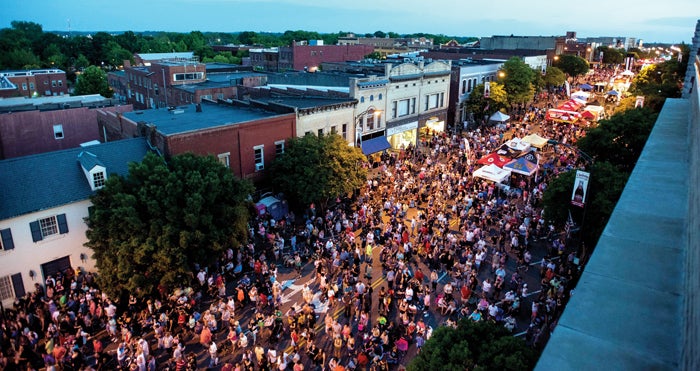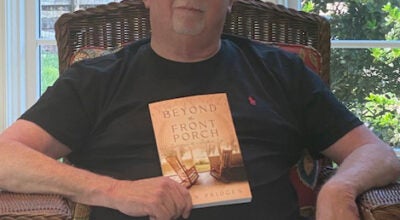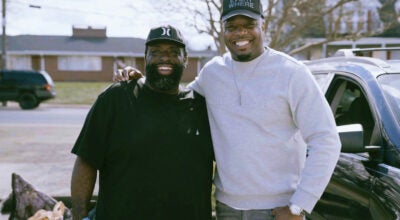Swine flu refugees become unlikely celebrities at home and abroad
Published 12:00 am Tuesday, December 1, 2009
Editor’s note: This the second part of Cameron Kirker’s quarantine in Hong Kong due to fear of swine flu. Yesterday, he described his arrival and the news of the quarantine.
By Deirdre Parker Smith
dp1@salisburypost.com
Once Cameron Kirker of Salisbury and his business partner, Peter Cannon of Columbia, S.C., found out they were going to be held in quarantine in Hong Kong, they had few options.
But they didn’t know that.
They had the misfortune of spending one night in the same hotel as a Mexican man who came down with swine flu, the H1N1 virus. When they tried to leave Hong Kong to continue their trip, they were whisked into what Kirker laughingly calls “flu jail.”
After being told at their original hotel, “If you surrender, you stay seven days,” they figured they’d move on.
Not so fast.
“A friend said he heard it was OK to travel,” Kirker said in a recent interview at the Post.
So they got to the border at Shenzhen and the official scrutinized their passports. The government knew they had been at the infected hotel.
Kirker, who laughs about much of the experience, says he and Cannon were interrogated and checked by medical staff. The staff was decked out in masks, gowns, gloves.
“As I turned around, I noticed they were spraying down the kiosk where the official looked at our passports, disinfecting it.”
Wife Carol Kirker, a nurse who did not take the trip, said, “It was like they had the bubonic plague or something.”
Kirker said they were then taken to the train station, where the people escorting them were dressed in full hazmat suits, with breathers and helmets, as they loaded them into an ambulance.
“We spent four or five hours at the hospital in Kowloon,” a section of Hong Kong. “The doctor said, ‘I know you’re not sick and I know you’re not going to get sick, but it’s not up to me.’ Then he said we were going to a camp.
“Well, I heard camp and I immediately thought …” here Carol interrupts him: “Like concentration camp.”
“I thought a tent city,” Cameron said. They rode about an hour, to the outskirts of the city, to the Lady MacLehose Holiday Village, for children 4-9.
“The stuff there was pretty small,” Kirker laughs, but they stayed in bungalows, he and his friend sharing one with two large cherries painted on the outside. “I had the child’s room, and the mattress was practically on the floor, so I took the other mattress and put it on top.”
The mattress and pillows were covered in something like vinyl. “I guess in case the kids have an accident,” but he slept a little that first night.
The next morning, they were greeted by staff in full medical regalia, “that blue, gauzy stuff. … And there were armed guards.” They, too, were given blue gauzy stuff and wore it for a few minutes, but then took it off because it was so hot.
At breakfast, they met the others, 40 to 60 people, but only seven or eight who spoke English.
“There was a large staff, people watching us all the time. Most had been hired from the local village.”
Every day they filled out forms and had their temperatures taken.
Nobody could or would answer any questions. “Nobody had any authority. The answer was always, ‘Well, we’ll see.'”
But they were very nice to the Americans. “They wanted to please us.”
Kirker and Cannon quickly went through the stages of something like grief ó disbelief, anger, “although it was kind of funny”, negotiation, then reconciliation. “We were going to be there exactly seven days,” he said. “Period.”
They developed quick, intense relationships. There was an Iranian woman, Victoria Sord, who was married to a New Zealander and was going to Japan for a new job.
“She was Muslim and she cried all the time, she told us. And she prayed someone would come to help her.” She felt so alone and no one much spoke English. Kirker and Cannon arrived the next day and she wept when she met them and told them God had answered her prayers.
A woman from British Columbia was there because she had been to Mexico three weeks earlier. “There was no reason for her to be quarantined,” Kirker said, “and we advocated for her. … She got to leave early.”
One British man made a South China newspaper front page which displayed a picture of him taking pictures of people taking pictures of him.
Kirker told his fellow “campers,” if life gives you lemons, you make lemonade.
Their food went from bad to better, and one night, they taught everyone to make a version of s’mores. “So they learned about that and how to eat burning marshmallows.”
The Chinese started bringing in English-language newspapers and the American consulate sent some books and movies. All TV was in Chinese, but they could figure out what was going on anyway.
“We had more freedom in camp than they did in the hotel. We could go outside and walk around camp. We learned each other’s life stories.”
With an Internet connection and Cannon’s phone with global capacities, they could stay in touch with their families, and blog for the Wall Street Journal.
The consulate sent daily packages with notes that said, “Get Home Soon.” Other people were getting long letters from their consulates, Kirker laughed.
“It was like ‘Groundhog Day’; the same thing kept happening over and over.”
Then, at 8:15 p.m. on the last day of their confinement, they were all loaded on a bus. They’d entered the camp seven days earlier, at 8:30. They waited on the bus for 15 minutes, looking out at an unfamiliar Chinese crowd.
“Then Peter said, ‘That’s the staff?’ We didn’t recognized them without the masks and gowns. We’d never seen more than their eyes.”
As they arrived at yet another hotel, reporters and videographers applauded, a crowd of concierge people parted to let them in, “like we were royalty.”
“We were on TV nonstop from then on.”
Kirker’s valuables were still missing ó presumably at the quarantined hotel, but he got them and most of his other things back. “The place was spotless. I would have eaten off that floor.”
The media descended and chauffeured them around on errands to get an exclusive story.
The government gave them all sorts of gifts, including clothes, tickets to Chinese attractions and other items they mostly gave away.
When they went to a restaurant, they were recognized, and at a shop in Kowloon and at the airport and on the plane.
“We were more famous than Jackie Chan,” Kirker said. At their connecting flight in Chicago, the customs agent recognized them and passed them through quickly, wishing them a safe trip.
But when they arrived in Charlotte, they were bombarded by media once again.
Coming home to Salisbury, where Kirker said no one knows him, was something of a relief.
“The people in China could not have been nicer. They did everything to keep us happy, and then they told us how nice we were.
“It wasn’t that bad, except for not being able to leave.”
Kirker said he and Cannon have been invited to continue their blogs for the Wall Street Journal, at least for a while. “We haven’t told the coming home story yet.”
And he said he’ll go back to finish his business.
Then he laughs.
“In one week I was more famous than Jackie Chan and I got to blog for the Wall Street Journal. That’s not too bad.”




